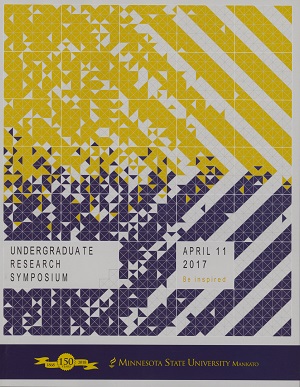Sampled College Students' Attitudes Toward the National Suicide Prevention Lifeline (NSPL)
Location
CSU Ballroom
Start Date
11-4-2017 2:00 PM
End Date
11-4-2017 3:30 PM
Student's Major
Health Science
Student's College
Allied Health and Nursing
Mentor's Name
Amy Hedman-Robertson
Mentor's Department
Health Science
Mentor's College
Allied Health and Nursing
Description
Purpose: determine a sample of university students' knowledge of the NSPL, self-efficacy in helping someone suicidal, perceived helpfulness and likelihood to use the NSPL to help another.
Of the 560 participants, nearly 60% stated that at least one person had expressed suicidal thoughts to them. Mean knowledge score of the NSPL was 1.99 (SD = 1.26), range 1-4. Mean self-efficacy score was 2.81 (SD = .58), range 1 to 4. Pearson correlation showed a significant, weak relationship between self-efficacy and reported number of people who expressed suicidal thoughts to participants, r(550) = .26, p = 0. Mean perceived helpfulness score was 2.78 (SD = .85), range 1 to 4. Participants reported higher perceptions of the NSPL helpfulness for warning signs that included suicide in the description. Mean likelihood to call the NSPL for another was 2.41 (SD = .89), range 1 to 4. A significant, positive moderate relationship was observed between likelihood to call the NSPL for another and perceived helpfulness of the NSPL in helping another, r(533)= .41, p < .01. Analysis showed that knowledge of the NSPL, self-efficacy, and perceived helpfulness of the NSPL predicted participants' likelihood to call the NSPL index, F(3, 528) = 42.11, p < .01.
Despite many participants indicating that another had expressed suicidal thoughts to them, their self- efficacy to recognize suicidal thoughts and plans in another was low. Possible reasoning for low utilization of NSPL includes stigma towards suicide, usage of other resources, and uncertainty of outcomes related to NSPL
Sampled College Students' Attitudes Toward the National Suicide Prevention Lifeline (NSPL)
CSU Ballroom
Purpose: determine a sample of university students' knowledge of the NSPL, self-efficacy in helping someone suicidal, perceived helpfulness and likelihood to use the NSPL to help another.
Of the 560 participants, nearly 60% stated that at least one person had expressed suicidal thoughts to them. Mean knowledge score of the NSPL was 1.99 (SD = 1.26), range 1-4. Mean self-efficacy score was 2.81 (SD = .58), range 1 to 4. Pearson correlation showed a significant, weak relationship between self-efficacy and reported number of people who expressed suicidal thoughts to participants, r(550) = .26, p = 0. Mean perceived helpfulness score was 2.78 (SD = .85), range 1 to 4. Participants reported higher perceptions of the NSPL helpfulness for warning signs that included suicide in the description. Mean likelihood to call the NSPL for another was 2.41 (SD = .89), range 1 to 4. A significant, positive moderate relationship was observed between likelihood to call the NSPL for another and perceived helpfulness of the NSPL in helping another, r(533)= .41, p < .01. Analysis showed that knowledge of the NSPL, self-efficacy, and perceived helpfulness of the NSPL predicted participants' likelihood to call the NSPL index, F(3, 528) = 42.11, p < .01.
Despite many participants indicating that another had expressed suicidal thoughts to them, their self- efficacy to recognize suicidal thoughts and plans in another was low. Possible reasoning for low utilization of NSPL includes stigma towards suicide, usage of other resources, and uncertainty of outcomes related to NSPL
Recommended Citation
Klicka, Krystal. "Sampled College Students' Attitudes Toward the National Suicide Prevention Lifeline (NSPL)." Undergraduate Research Symposium, Mankato, MN, April 11, 2017.
https://cornerstone.lib.mnsu.edu/urs/2017/poster-session-B/14




